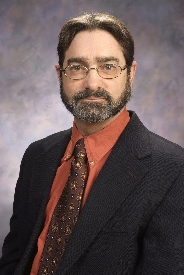Michael Romano Named 2008 Distinguished Faculty Lecturer
February 6, 2008

Michael Romano, 2008 Distinguished Faculty Lecturer
[Download Print-Quality Image]
MACOMB/MOLINE, IL - - Michael Romano, Western Illinois University professor of biological sciences, will deliver the University's 2008 Distinguished Faculty Lecture, which will explore benefits and problems DNA technology has on society.
Romano's lecture, "DNA Technology and Pandora's Box," will be presented at 7 p.m. Wednesday, March 19 in the College of Fine Arts and Communication Recital Hall, Simpkins Hall, on the Macomb campus and at 3 p.m. Monday, March 24 at the WIU-Quad Cities (Room 102), in Moline.
"Current DNA technology has caused extraordinary changes within our society," Romano said. "While this technology is having increasingly positive effects on our everyday life, it also poses great problems for society, particularly in the area of healthcare. Genetic information has the potential for harming individuals if misused and legislative attempts at preventing this will be discussed.
"I think people will find some of the stories and anecdotes involving DNA applications both amusing as well as surprising. Although, some will know a few of the applications from popular television shows and the like, I hope to emphasize the significance to both science and society regarding the application of DNA technology," he added.
Romano, curator of reptiles and amphibians for Western's biology department, specializes in the areas of population genetics and molecular ecology of a wide variety of animals. He has a special interest in the genetic relationships of the hylid frogs, Mississippi turtles and Illinois wild turkey.
Much of Romano's research since he joined Western's faculty in 1984 has been through the University's Alice L. Kibbe Life Science Station, located near the Mississippi River in Warsaw (IL). Each summer since 2002, Romano and five co-principal investigators from the department, mentor a team of high-achieving high school students from across the country through the Student Challenge Awards Program's (SCAP) Earthwatch Institute, as they work together on longterm riparian (river bank) and aquatic ecosystem monitoring projects on the Upper Mississippi River.
"We are very proud of the SCAP program at our field station. Over the past few years, my colleagues and I have gotten very high quality assistance from some of the brightest young high school students I have ever met," Romano said. "Many of these students have found their field experience at Kibbe so valuable that they have actually changed their minds about their career paths and gone into ecology, environmental science or other related biological fields."
Kibbe is unique as a field station because of its geographic location in the Upper Mississippi River System (UMRS), an area of great ecological and economic importance which in 1986 was recognized as a nationally significant ecosystem by Congress, Romano said.
The teaching and research station is on a 200-mile stretch of the UMRS and offers a diversity of aquatic and terrestrial communities, which makes the station an important venue for future studies of the influence of human activities on the UMRS and the unique ecosystems within the UMRS watershed. The portion of the river associated with Kibbe and Pool 19, just upstream of the station, provides critical habitat to some 40 freshwater mussels and 150 species of fish, including the state endangered lake sturgeon, the rare blue sucker and paddlefish; as well as 90 species of breeding birds, 70 species of butterflies and some of the most rare diverse plant communities in the Midwest in hill prairie, sand prairies and oak savannas, he added.
Romano was among four co-principal investigators who helped secure a $243,300 grant from the National Science Foundation (NSF), which – along with matching money from the University – funded a nearly $500,000 environmentally-friendly multipurpose facility addition to Kibbe which opened in 2004. The NSF grant was among 18 funded projects from 68 proposals nationwide.
He has presented some 60 professional papers and abstracts; has contributed 19 articles to professional journals; and has supervised 15 master's theses and nine honors theses. He has served on numerous departmental committees. At the University level, Romano has served as vice president (2004-2007) of the Western Illinois Chapter of University Professionals of Illinois (UPI), the UPI/Administration negotiation of contract agreement (2006-2007), the University Graduate Council (2006-2007) and the Distance Learning Advisory Board (2007). He also served as an elected member of the Upper Mississippi River Research Consortium executive board in the roles of president (2003-2004), vice president (2002-2003) and secretary (2000-2002).
Prior to coming to Western Illinois, Romano was a Teaching Fellow (1980-1981 and 1982-1983) and Dissertation Fellow (1983-1984) at Miami University, Oxford, OH.
Romano earned his Ph.D. (1984) from Miami University and his master's (1980) and bachelor's (1976) degrees from the University of Vermont.
Western Illinois first presented an annual lecturer award in 1969 to honor an outstanding faculty member whose professional development in research or creative activity, teaching and service to the University represent the highest standards of the academic community. In 1998 the award was renamed the Distinguished Faculty Lecturer.
Posted By: University Communications (U-Communications@wiu.edu)
Office of University Communications & Marketing

Connect with us: